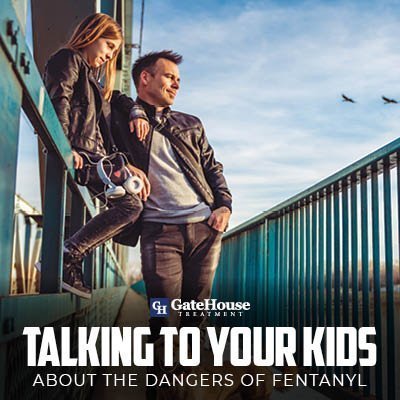
In the face of an ongoing opioid epidemic, losing 200 Americans a day to opioid overdoses, we have to talk about fentanyl and the dangers associated with this drug. How do you talk to teenagers and kids about the dangers of drugs without feeling like a bad anti-drug PSA? The prevalence of drugs being laced with fentanyl is growing; the danger isn’t only restricted to opiates anymore. Learn how to come together with your children to give them the proper education and carve a pathway for open communication.
What is Fentanyl?
Fentanyl is a synthetic opioid drug that is used to treat severe pain. It’s similar to morphine but 50-100 times stronger. It is used for people who have chronic pain but are tolerant to other opioids. More recently fentanyl is showing up in illicit street drugs like heroin and fake pain pills.
Fentanyl is a synthetic opioid, meaning it is manufactured in a lab with chemicals. It is a doctor prescribed, but there are now clandestine labs that are manufacturing fentanyl. Fentanyl is also being shipped overseas for lower prices and in high quantities and then used to cut into street drugs like heroin and cocaine. These are the things you need to know when you talk to your kids about what fentanyl is, it’s true dangers, and how it’s not just the opioid epidemic that is taking lives from fentanyl overdoses.
Talking to Your Kids About Fentanyl Abuse
There isn’t a one-size-fits-all syllabus for talking to your children about drugs. There are a few guidelines that you can follow when talking to your teens and kids about drugs. With the opioid crisis and the ever-increasing amount of fentanyl being found in other drugs, it can be a life or death conversation to have with your children.
There are 3 guidelines that you can follow when having the conversation on how to make it easier for you and your children:
1. It’s never too early to talk to your kids about drug use, especially the dangers of Fentanyl.
Most importantly, you can have a conversation about making healthy decisions to ease into the heavy discussion of drug abuse. The younger they are, the longer they will hear about the danger of drugs and alcohol. Also, talk about things like exercise, healthy eating, and investing in hobbies to keep them away from falling into the wrong things as they grow older. It is essential, to be honest with them with the information that you have, especially when it comes to the dangers of fentanyl.
Opening the door to the drug abuse conversation earlier in life, lets your kids know that it’s okay to talk about this stigmatized topic. It also helps them understand it is okay to ask questions about these things, it keeps the communication open and honest when talking about drug use with your kids.
2. Tell your kids that all drugs are potentially dangerous, and many of them can contain Fentanyl.
When we only talk to our kids about the dangers of fentanyl and other opioids it can seem like other illicit drugs are okay to use; that’s not the case. The myth that only some street drugs are dangerous isn’t true. With fentanyl now showing up in other street drugs and causing overdoses, it is important to point out that all drugs can have life-ending consequences.
There is no way to recognize if the drugs you’re buying on the street are contaminated with fentanyl, even if you have fentanyl testing strips, most people won’t think to test cocaine, MDMA, or anything that isn’t heroin. Taking other drugs that contain fentanyl, even in small amounts, can cause a fentanyl overdose.
3. Make sure they never use alone and don’t mix drugs; Fentanyl can be deadly in trace amounts.
Especially with teenagers, they’re most likely going to experiment with drugs or alcohol at some point. Although complete abstinence is the only way to avoid any of the consequences related to drug use, it isn’t always the case. If you know or suspect that your kids are experimenting with drugs or alcohol, or have friends that may be, educate them on what to do in the event of an overdose. Fentanyl and alcohol are both depressants; if they’re unknowingly mixed, it could stop the breathing of an unsuspecting teenager.
Mixing drugs, even prescription drugs like Xanax and alcohol can have a deadly effect. Make sure that your kids know this critical information and if they have questions, be open to answering them. If you don’t know the answer, do research, and broach the subject again.
While many teenagers and young adults are already trying substances, it’s never too late, or too early to have a conversation about the dangers of drug use with your children. Encouraging your kids to make good choices is all that you can do, equip them with the proper education and keep lines of communication open. If you believe that your child may be using drugs but aren’t sure, look at the signs and symptoms of drug abuse. If you know that your child is already abusing drugs and needs help, contact us at GateHouse Treatment today at (855) 448-3588. We have someone on call 24/7 hours a day to help you and your loved one.
- Cymbalta Withdrawal: Causes, Symptoms, And Management - October 12, 2023
- Boredom in Recovery: 5 Tips to Avoid Relapse - October 6, 2023
- Overconfidence and Rehab: Avoiding Relapse - October 4, 2023




